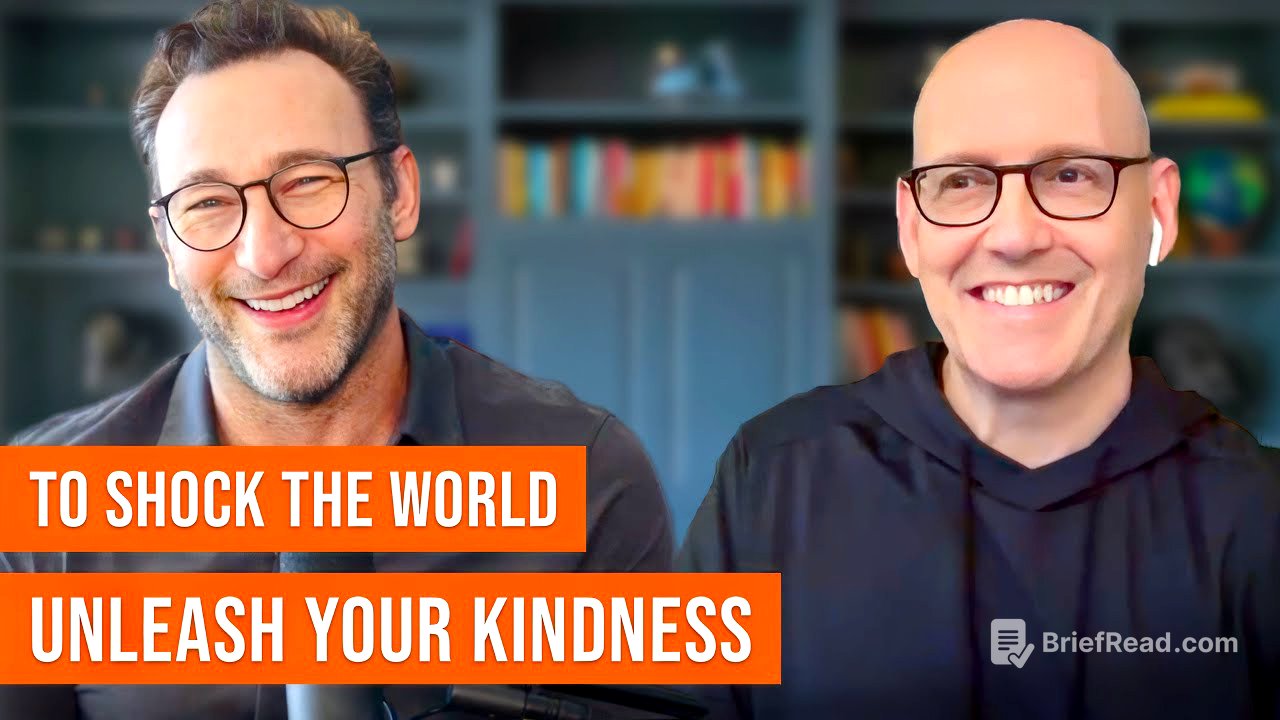TLDR;
In this episode, Simon Sinek interviews Brad Meltzer, a prolific writer known for his mystery books, comics, and inspiring biographies. They discuss the importance of empathy, kindness, and the human touch in storytelling, especially in the age of AI. Meltzer shares personal stories and insights about finding one's "why," the role of failure in success, and the magic of giving to others.
- The key ingredient of Superman's success is Clark Kent, representing the desire to do good.
- Ordinary kindness and empathy can have a profound impact on others.
- Failure and struggle are essential components of success and personal growth.
- AI lacks the taste, feelings, and soul necessary for authentic storytelling.
- Magic is a gift that you give other people.
The Birth of Superman [0:00]
In 1938, as World War II looms, two Jewish 17-year-olds create Superman, which sells a million copies. The key to Superman's success is Clark Kent, who embodies the desire to do something good for others. Unlike other heroes, Superman's appeal lies not in his powers but in his humanity and the wish to do right by others.
Meet Brad Meltzer, Master Storyteller [0:34]
Brad Meltzer is a prolific writer who has written Superman, Spider-Man, and Batman comics, as well as thriller and conspiracy novels. He has also created inspiring short biographies for young readers and delivered a viral commencement speech at Michigan. Meltzer's work emphasizes empathy, humility, and decency, proving that the human touch is essential in storytelling, especially in the age of AI.
Two writers hop on a podcast [2:02]
Simon Sinek expresses his admiration for Brad Meltzer's prolific writing career, highlighting the numerous books he has written across various genres. Meltzer credits Sinek for helping him discover his "why," which is the belief that ordinary people can change the world. They reminisce about their early friendship and how they supported each other in their respective careers.
Ordinary kindness can change a life [9:05]
Brad Meltzer shares a story about his ninth-grade English teacher, Sheila Spicer, who told him, "You can write," which changed his life. He also recounts how a neighbor named Miri, whom he thought was Mercy, helped his family when they were struggling financially by offering them her apartment. These acts of kindness and empathy had a profound impact on Meltzer and reinforced his belief that ordinary people can change the world.
Negative people become inspiration [12:49]
Meltzer recounts an incident from his time working at a Häagen-Dazs, where a rude customer told him he would be stuck there for the rest of his life. Initially, this bothered him, but it later became a source of inspiration. He also shares the story of a coworker, Nick Wicket, who overcame adversity to achieve his dream of training dolphins at SeaWorld, reinforcing the idea that ordinary people can achieve extraordinary things.
"Ordinary" vs. extraordinary people [15:55]
Meltzer discusses what ordinary and unordinary people have in common: they are doing what they love and are fully committed to it. He emphasizes the importance of passion, time, intentionality, and full commitment in achieving success. Sinek adds that Meltzer's superpower is his ability to inspire others.
Don't just follow your bliss
Meltzer and Sinek discuss the common but unhelpful advice to "follow your bliss." Meltzer emphasizes that it's not just about loving what you do, but also about full commitment and perseverance through failure. He shares a story about the Wright brothers, who brought extra materials for multiple crashes every time they went out to fly their plane, knowing they would fail and rebuild.
A.I. storytelling vs. human storytelling [22:24]
Meltzer recounts an experiment where he tried to write a book with AI, using his own work as a test. The AI could outline the book perfectly but failed to capture the human emotion and taste necessary for authentic storytelling. His daughter concluded that AI lacks taste, feelings, and soul, which are essential for creating impactful stories that resonate with readers.
True Classic: an ad with authenticity [26:42]
Ryan Bartlett, the founder of True Classic, joins the conversation to share a story about a $40 million bet on inventory that didn't work out as planned. Despite the failure, Bartlett loved that the team made the decision together and believed in each other. This story highlights the importance of taking risks and having confidence in one's team, even when things don't go as expected.
Superman vs. Batman [30:21]
Meltzer discusses his favorite superheroes, Superman and Batman. He loves Batman because of his relentless pursuit of justice, even though he knows he will never stop crime. Meltzer identifies with Clark Kent because he represents the ordinary person who wishes to do something extraordinary. He emphasizes that Superman's heart, taught by his ordinary parents, is what makes him a hero.
Supervillains and villain motivation [34:49]
Meltzer discusses his favorite villains, noting that he struggles to identify with them. He explains that the best villains are the opposite foil to the hero, such as the Joker to Batman. Meltzer dislikes revenge-based motivations, preferring villains who represent a fundamental opposition to the hero's ideals.
Failure and struggle make you who you are [41:19]
Meltzer emphasizes the importance of struggle and failure in shaping who we are. He recounts a moment when his agent told him, "Sorry, kiddo," after he didn't get a book deal, and how he replays that moment every day to stay grounded and thankful. He believes that the struggle is more important than the finale and that it's essential to share those moments of failure to inspire others.
After 78 books, which is Brad's best? [44:12]
Meltzer reflects on his 78 books and identifies his first book as his best because he didn't know anyone would see it, allowing him to be completely honest. He also discusses how he analyzed his best books to identify common elements, which led him to focus on creating compelling characters. Meltzer shares that his characters Zigg and Nola are reflections of himself, representing his beliefs in both putting good into the world and fighting for justice.
Brad's 2024 commencement speech at Michigan [48:49]
Meltzer discusses his commencement address at the University of Michigan, where he spoke about magic, empathy, and kindness. He explains how he used the analogy of magic tricks to illustrate the importance of switching places with others and showing empathy. The speech resonated deeply with the audience, leading to widespread requests for the text and a book deal.
Magic is a gift that you give other people [53:19]
Meltzer emphasizes that magic is never something you do for yourself; it's a gift you give to others. He credits Sinek for teaching him this lesson and acknowledges that his work is always for someone else. Sinek expresses his gratitude for Meltzer's insights and inspiration, highlighting the hope that he brings to the world.









